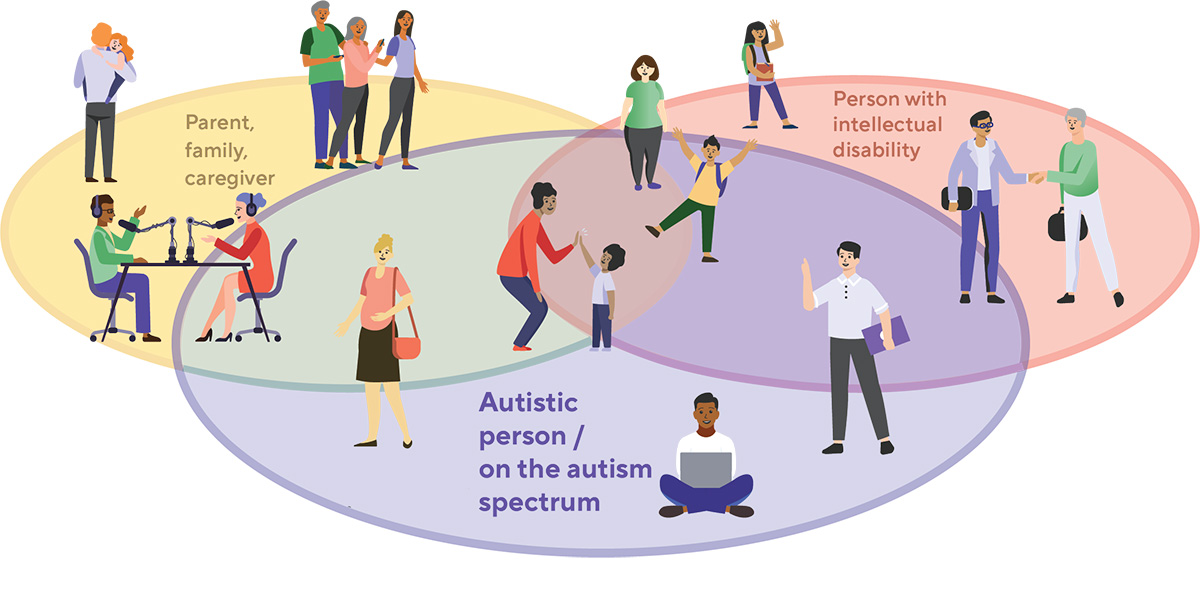
About AIDE Canada
What is AIDE Canada?
At its core, the Autism and/or Intellectual Disability Knowledge Exchange Network (AIDE Canada) is a tool to connect members of our community to the information and resources that they need. We deliver credible, reliable, and evidence-informed resources in an unbiased and accessible way.
How is AIDE Canada Funded?
AIDE Canada is funded by the Public Health Agency of Canada and by in-kind contributions from our hub network. We do not accept grants of funding from any other sources.
-
Resource CreationTopic
Choose general topics and resource format based on consultation with stakeholders
-
Focus
Meet with key researchers and stakeholders in the field to provide background/context and decide scope and focus of the project
-
Research
Conduct a literature review to summarize current research findings and ensure we are creating a unique resource
-
Recruit
Recruit top experts and advocates to be authors/presenters for the project
-
Create
Authors/Presenters create resource with regular input from AIDE Canada’s content development team
-
Review
Completed materials are sent for review to both: a) self-advocate or family member b)a researcher or clinical specialst for feedback and edits
-
Translate
Translate resource into French or English before publication on
What is AIDE Canada's approach to ableism?
We have tried to eliminate as many instances of ableism as we can on our website. Ableism is discrimination in favor of people who are able-bodied and/or neurotypical. Some forms of ableism are obvious, like using accessible parking spaces without a permit, or wearing scents in a scent-free environment. But not all ableism is easy to spot. In the context of the autism and/or intellectual disability community ableism might mean assuming that someone who is non-verbal can’t understand you, or workplace employee evaluations that focus on “cultural fit” and exclude quantifiable outcomes.
Here are some examples of what we have done to minimize ableism on our site:
Our accessibility widget: click the human icon in the lower right corner of your screen for more information
Our connection centre: staff are ready to text or voice-chat with community members who would like assistance using our site
Being respectful of individuals’ identity language preferences: we ask each individual how they prefer to be identified and use their stated preference. Some of our self-advocate staff prefer to identify as autistic, others prefer to identify as a person with autism. If you see us using either term to refer to a particular person it’s because we asked them and they told us that this was their preference.
AIDE Canada endorses the social model of disability as described in the UN Convention on the Rights of Persons with Disabilities. We believe that it is society’s response to difference, not the difference itself, that creates disability.
How does AIDE Canada find or create resources for the website?
Between January of 2019, when we launched our initiative, and September 2020, when we released the full version of our library and website, we held dozens of formal and informal meetings with groups, organizations and individuals.
You can read about who we spoke to, what we asked, what they told us and how we are using this information in our 2019/2020 Community Consultation Report.
Moving forward, AIDE will remain committed to ongoing input and guidance from our community. Understanding the wide range of individual, family and community needs and priorities is integral to our work. Please check out our “work with us” page for current job posts and consultation opportunities.
You can see a flow chart that describes how we create resources below. This is the process that we follow for resources like toolkits, webinars and videos. We also have other kinds of resources: our “locate” map and our lending libraries.
The resources that you see on the locate map are gathered by AIDE Canada, and partner hub staff. Staff search for programs in a particular area using search engines like Google. After they find a resource they also screen it. Staff investigate the program
and answer questions about the resource, such as whether this program is
The resources that you see in our lending library are selected by our librarian. To keep up to date on current issues and perspectives, our librarian follows a variety of authors, researchers, publishers and self-advocates. To select new materials for the library, she reads book reviews, consults with focus groups and listens to community suggestions offered through the "suggest a book" feature on the library website. “suggest a book” feature.
If you have an interest in our work dating back to 2020, we invite you to review our report .
